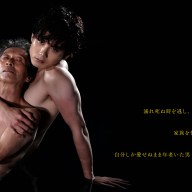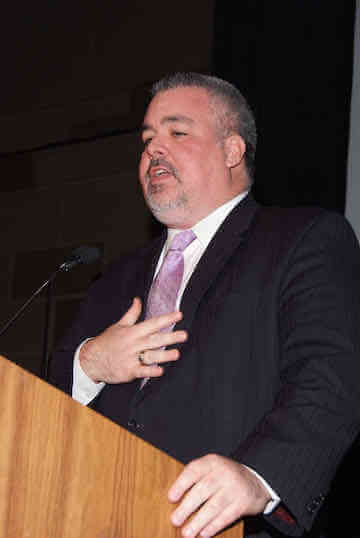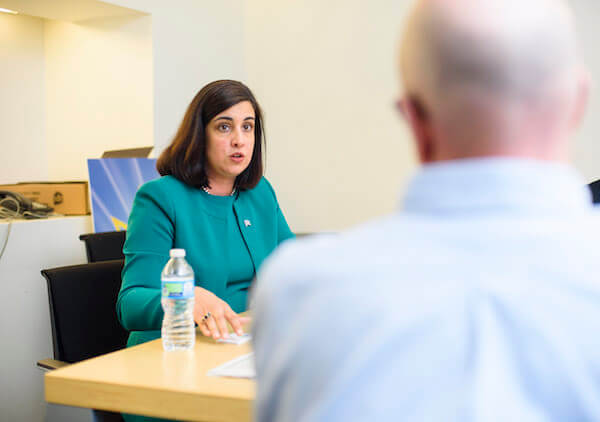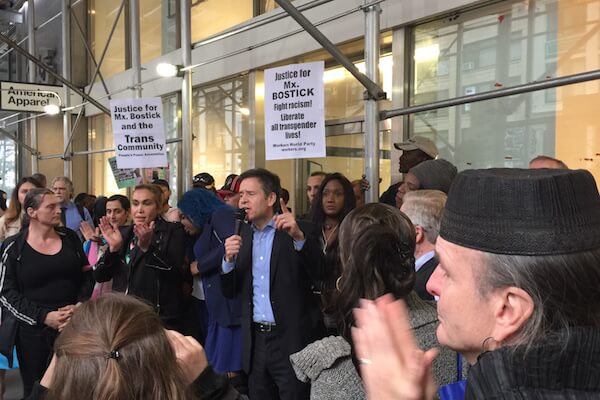Equality New York co-founder Gabriel Blau and Bronx immigration rights attorney Luis Fernando Mancheno, a member of the EQNY advisory board, at last year’s LGBTQ Pride Rally in Foley Square. | DONNA ACETO
When the 25-year-old Empire State Pride Agenda, in late 2015, abruptly announced it was closing up shop — with only a vague pledge, that it never fulfilled, to keep its political action committee functioning — activists, advocates, and service providers in the LGBTQ community across New York were at a stunned loss as to what would come next. Matt Foreman, who led the group for two stints between 1998 and 2003, was the most forthright in expressing his alarm, warning that “the job isn’t half done” and arguing that the large and diverse queer constituency statewide needed a voice to ensure that “lived equality” became a reality.
In the minds of most LGBTQ New Yorkers, nothing has arrived on the scene to carry on and move beyond the progress the Pride Agenda achieved during the most fruitful period of advances in the community’s history. Largely behind the scenes, however, there have been several years of outreach, meetings, conversations, and planning. Those efforts are now poised to bloom into full view — interestingly, on at least two fronts.
Equality New York, an almost all-volunteer group that is building from the ground up with the support of a wide array of advocacy and service groups statewide in a diverse range of communities, is not, in fact, new. It began taking shape in the second half of 2016, barely six months after ESPA’s departure. But for EQNY, Tuesday, May 8 is something of a ready-for-prime-time coming out, with hundreds of activists from around the state converging on the Legislature in Albany for LGBTQI Advocacy Day.
Statewide Agenda Advances on Two Fronts
The Albany effort is supported by a seven-page Legislative Platform that concisely lays out more than 20 legislative goals addressing four broad areas: gender expression, identity, and inclusivity; youth issues; discrimination against “intersecting” populations, including immigrants as well as parents, veterans, married couples, and business owners; and a group of issues, including comprehensive sexuality education and services for seniors, for which legislation still needs to be been drafted.
Advocates affiliated with Equality New York also had a recent sit-down with Alphonso David, the out gay counsel to Governor Andrew Cuomo, and other top officials in his administration to discuss the Gender Expression Non-Discrimination Act (GENDA), stalled for 15 years by Republican intransigence in the State Senate. Given Cuomo’s pride in his 2015 directive that led to regulations interpreting sex nondiscrimination provisions of the state Human Rights Law to protect New Yorkers based on their gender identity and expression, the administration’s commitment to going the step further to get those reforms codified in law cheered transgender activists at that meeting and others briefed on what took place.
Separate from the Equality New York push — but including at least some of the same groups working with EQNY — was a congress convened earlier this month in Albany by the New York City LGBT Community Center. According to Center executive director Glennda Testone, the gathering, which included about 30 executive directors of service-focused LGBTQ organization statewide, was “several months in the planning” and first discussed seriously among her staff going back about a year.
Glennda Testone, executive director of the LGBT Community Center. | DONNA ACETO
Testone explained that her team, with the assistance of several outside advisors, carried out a “landscape analysis” that drew on data collected about New York’s LGBTQ community in 2015 and a look at advocacy efforts going on in other states. From that base, the Center began outreach to groups statewide to determine how current and relevant the information from three years ago remains.
The purpose of the Albany gathering, she said, was to begin getting formal input from other organizations on shaping an advocacy program that the Center plans to host in-house, with an approximate budget of $500,000 annually over its first five years. The pillars of that program, Testone said, would be convening diverse voices to work on issues, developing a “proactive and people-centered policy agenda,” increasing civic and community engagement on the ground, and supporting the next generation of leaders.
Developing that policy agenda, Testone emphasized, is a work in progress. The Albany meeting, she said, was a “first step in what will be a longstanding effort.”
The 30 or so leaders in Albany at the Center’s invitation also scored a high profile meeting, sitting down with the governor for almost an hour. Like his counsel David, Cuomo voiced support for GENDA but also cautioned about the hurdles that remain in the Senate. As he did when he took the lead on the marriage equality fight in early 2011, Cuomo underscored the critical importance, in his view, of the community statewide speaking with a united voice in Albany.
Unity can often be a tough nut, and in a community that has long been led primarily by cisgender gay men, most of them white, there is widespread wariness in communities of color and among transgender and gender non-conforming New Yorkers about the movement’s commitment to the specific challenges they face on a daily basis. Numerous advocates from organizations representing these communities who spoke to Gay City News, however, praised the efforts by both EQNY and the Center to enlist their input and active participation.
Having two different efforts moving along separate tracks, even with intersection and overlap, of course, also poses risks to unity, though groups that spoke to the newspaper praised both efforts, noting that there’s plenty of work to be done and pointing out that EQNY has an political action arm able to do lobbying and make campaign contributions.
Still, there is an apparent fundamental difference in approach between a largely volunteer effort that aims to “build power and hand it off” to local groups on the ground and an effort housed within an already existing major service provider. Gabriel Blau, a co-founder of EQNY who is the former executive director of the Family Equality Council and now consults for LGBTQ non-profits, noted that Equality New York is a member of the nationwide Equality Federation of statewide LGBTQ advocacy groups, and that none of the federation members are units within larger service providers.
It may well be, however, that any potential for conflict is for now merely theoretical. The risk is not a concern voiced by groups statewide that are familiar with both efforts.
Sean Coleman, an out transgender African-American man who founded Destination Tomorrow, a grassroots South Bronx agency that provides neighborhood-based services to the LGBTQ community there, serves on advisory boards both for the congress the Center convened and EQNY. Both Testone and Blau, he said, “have been very intentional” in soliciting buy-in and trust from organizations like his that he said have traditionally been ignored. The script is not yet written, he said, on precisely where either group is headed, but he is eager to “stay in the loop” on both efforts.
Brooke Malloy, who has headed the Rockland County Pride Center since it launched two years ago, described the Center’s congress in Albany as “the best use of my time as executive director of this agency.”
“It was the first time that as an executive director of a smaller group, but in a suburb of New York, that I felt like we had a voice,” she said. “And that people upstate and people of color and trans and gender non-conforming people had a voice.”
The experience, Malloy added, was “1,000 percent better” than any such gatherings she attended in the past.
Asked about EQNY’s efforts, she said, “It’s critical that they move forward.” Then noting that group’s ability to play politically, she added, “We are all staying in our lane.”
Tandra LaGrone, who for more than a dozen years has been the executive director of In Our Own Voices, which provides services to LGBTQ people of color in seven upstate counties centered on Albany, was at the congress convened by the Center.
“The most important part for me was seeing other people of color organizations in the room,” she said. “I’ve often found our group the only one in a meeting.”
Explaining she has not had too much contact with EQNY, LaGrone said her group had been invited by Equality New York to participate in the May 8 Advocacy Day.
Ari Moore, an African-American transgender woman and former police officer in Buffalo, is active in Erie County Democratic politics and also on the boards of the Stonewall Democrats of Western New York, the Pride Center of Western New York, and the Western New York Anti-Violence Project. She was effusive in her praise for the meeting EQNY members held with Alphonso David and other top Cuomo aides, saying, “Trans people were not only able to speak, but we were listened to. And I give the governor’s staff credit for that. We asked the governor’s people what we can do to help them help us.”
Mel Wymore, a transgender man long involved in trans and neighborhood activism on the Upper West Side, was not at the meeting with David, but said the commitment by the governor’s team to push forward on GENDA “is a shift in tone, definitely a positive shift.”
Kristen Browde, a Westchester attorney who is on the EQNY advisory board as well as the board of the LGBT Bar Association of New York and the National Trans Bar Association, credited the organizing work done on EQNY’s behalf by Blau and Juli Grey-Owens, a longtime Long Island transgender activist, saying, “I think Gabriel and Juli are doing exactly what needs to be done. Their vision is just the right thing.”
Luis Fernando Mancheno, an immigrants rights attorney in the Bronx who won asylum from his native Ecuador based on persecution he faced there, has been on EQNY’s advisory board since its launch and lauded the group for being “as inclusive as possible” throughout its ramp-up.
“It’s about understanding that there is such a thing as intersectionality,” he said. “I’m a gay man. I’m an immigrant, and I’m Latino. I care about LGBT rights, immigration rights, the needs of Latino people.”
Then, speaking to the urgency of what everyone involved in this story is working on, Mancheno added, “New York is a blue state but we are behind many of the other states on so many issues,” mentioning as one example the lack of a ban on so-called “conversion therapy” performed on minors.
In Buffalo, Bryan Ball, who heads up the Stonewall Democrats of Western New York, praised the “stellar level of cooperation” among grassroots groups working with EQNY, saying the group’s advisory board “has done a great job of being there for us without dictating to us. It’s refreshing and needed.”
The engagement over the past year, Ball predicted, “would come to fruition on Advocacy Day.”
Clifton Garmon, who is a policy analyst with VOCAL-NY, was a chief architect of the Legislative Platform EQNY released in advance of the Advocacy Day. Interestingly, the document is not branded with the EQNY logo but instead is bannered as the New York LGBTQI Advocacy Coalition. Its last page includes a list of nearly four dozen supporting organizations, including the Ali Forney Center, the Audre Lorde Project, Gays Against Guns, Make the Road NY, PFLAG NYC, Planned Parenthood Mohawk Hudson, SAGE, and the United Federation of Teachers. In a sign that the two nascent efforts underway statewide are finding common ground to work together, the LGBT Community Center is also on the list.
Garmon said he sees EQNY as the “glue that brings together everyone to build power in Albany to make real change.” Noting that much of the work he does at VOCAL-NY involves analysis of health data publicly available, he said one issue he is particularly concerned about is better data collection on the lives of LGBTQ New Yorkers, an issue addressed in a bill in the Legislative Platform sponsored by two out gay Democrats, Manhattan Senator Brad Hoylman and upstate Assemblymember Harry Bronson.
According to Blau, EQNY, which raised about $35,000 last year, should have a budget of about $100,000 this year, with half of that going to its PAC for the November election. He expects the group’s budget to double next year. This spring, the group’s first paid employee, a part-time community organizer, will begin work.




































